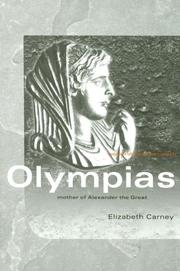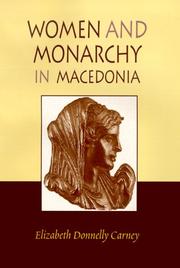| Listing 1 - 10 of 14 | << page >> |
Sort by
|

ISBN: 9780415333177 0415333172 9780415333160 0415333164 0203412788 9780203412787 9781134318148 9781134318186 9781134318193 Year: 2006 Publisher: New York Routledge
Abstract | Keywords | Export | Availability | Bookmark
 Loading...
Loading...Choose an application
- Reference Manager
- EndNote
- RefWorks (Direct export to RefWorks)
Queens --- Reines --- Biography. --- Biographies --- Olympias, --- Alexander, --- Macedonia --- Macédoine --- History --- Histoire --- Macédoine --- Olympias --- Antiquity --- Alexandre lll (roi de macédoine ; 0356-0323 av. j.-c.) --- Olympias (reine, épouse de philippe ii, roi de macédoine ; m. 316 av. j.-c.) --- Monarchies --- Biography --- Book
Book
ISBN: 9789490764111 Year: 2010 Publisher: [Diemen] G+J
Abstract | Keywords | Export | Availability | Bookmark
 Loading...
Loading...Choose an application
- Reference Manager
- EndNote
- RefWorks (Direct export to RefWorks)
Book
ISBN: 9780195365528 9780195365511 9780199711017 0199711011 0195365526 0195365518 9780190261245 0190261242 Year: 2013 Volume: *2 Publisher: Oxford, England : Oxford University Press,
Abstract | Keywords | Export | Availability | Bookmark
 Loading...
Loading...Choose an application
- Reference Manager
- EndNote
- RefWorks (Direct export to RefWorks)
The life of Arsino? II (c. 316-c.270 BCE), daughter of the founder of the Ptolemaic dynasty, is characterized by dynastic intrigue. This book provides the first accessible biography of this fascinating queen.
Arsinoe --- Egypt --- Greece --- Macedonia --- Thrace --- Egypte --- Grèce --- Macédoine --- History --- Kings and rulers --- Biography. --- Histoire --- Rois et souverains --- Biographies --- Biographie --- Grèce --- Macédoine --- Arsinoe - II, - Queen, consort of Ptolemy II, King of Egypt, - approximately 316 B.C.-270 B.C. --- Egypt - History - 332-30 B.C. --- Egypt - Kings and rulers - Biography --- Greece - History - Macedonian Hegemony, 323-281 B.C. --- Macedonia - History - Diadochi, 323-276 B.C. --- Thrace - Kings and rulers - Biography
Book
ISBN: 9781905125982 1905125984 Year: 2015 Publisher: Swansea : The Classical Press of Wales,
Abstract | Keywords | Export | Availability | Bookmark
 Loading...
Loading...Choose an application
- Reference Manager
- EndNote
- RefWorks (Direct export to RefWorks)
Macedonians (Ancient) --- Kings and rulers, Ancient --- Macédoniens --- Rois et souverains anciens --- Macedonia --- History --- Politics and government. --- Macédoniens
Book
ISBN: 3319758764 3319758772 Year: 2018 Publisher: Cham : Springer International Publishing : Imprint: Palgrave Macmillan,
Abstract | Keywords | Export | Availability | Bookmark
 Loading...
Loading...Choose an application
- Reference Manager
- EndNote
- RefWorks (Direct export to RefWorks)
Royal women did much more to wield power besides marrying the king and producing the heir. Subverting the dichotomies of public/private and formal/informal that gender public authority as male and informal authority as female, this book examines royal women as agents of influence. With an expansive chronological and geographic scope—from ancient to early modern and covering Egypt, Great Britain, the Ottoman Empire, and Asia Minor—these essays trace patterns of influence often disguised by narrower studies of government studies and officials. Contributors highlight the theme of dynastic loyalty by focusing on the roles and actions of individual royal women, examining patterns within dynasties, and considering what factors generated loyalty and disloyalty to a dynasty or individual ruler. Contributors show that whether serving as the font of dynastic authority or playing informal roles of child-bearer, patron, or religious promoter, royal women have been central to the issue of dynastic loyalty throughout the ancient, medieval, and modern eras. .
Europe—History. --- Imperialism. --- Women. --- Civilization—History. --- European History. --- Imperialism and Colonialism. --- Women's Studies. --- Cultural History. --- Human females --- Wimmin --- Woman --- Womon --- Womyn --- Females --- Human beings --- Femininity --- Colonialism --- Empires --- Expansion (United States politics) --- Neocolonialism --- Political science --- Anti-imperialist movements --- Caesarism --- Chauvinism and jingoism --- Militarism --- Europe --- Feminism. --- Feminist theory. --- Civilization --- Feminism and Feminist Theory. --- Cultural history --- Feminism --- Feminist philosophy --- Feminist sociology --- Theory of feminism --- Emancipation of women --- Feminist movement --- Women --- Women's lib --- Women's liberation --- Women's liberation movement --- Women's movement --- Social movements --- Anti-feminism --- Gay culture Europe --- History. --- Philosophy --- Emancipation
Digital
ISBN: 9783319758770 Year: 2018 Publisher: Cham Springer International Publishing :Imprint: Palgrave Macmillan
Abstract | Keywords | Export | Availability | Bookmark
 Loading...
Loading...Choose an application
- Reference Manager
- EndNote
- RefWorks (Direct export to RefWorks)
Royal women did much more to wield power besides marrying the king and producing the heir. Subverting the dichotomies of public/private and formal/informal that gender public authority as male and informal authority as female, this book examines royal women as agents of influence. With an expansive chronological and geographic scope—from ancient to early modern and covering Egypt, Great Britain, the Ottoman Empire, and Asia Minor—these essays trace patterns of influence often disguised by narrower studies of government studies and officials. Contributors highlight the theme of dynastic loyalty by focusing on the roles and actions of individual royal women, examining patterns within dynasties, and considering what factors generated loyalty and disloyalty to a dynasty or individual ruler. Contributors show that whether serving as the font of dynastic authority or playing informal roles of child-bearer, patron, or religious promoter, royal women have been central to the issue of dynastic loyalty throughout the ancient, medieval, and modern eras. .
Sociology of the family. Sociology of sexuality --- International relations. Foreign policy --- Higher education --- History of civilization --- History of Europe --- HO (hoger onderwijs) --- imperialisme --- vrouwenstudies --- cultuurgeschiedenis --- schrijfvaardigheid --- vrouwen --- Europese geschiedenis --- kolonialisme --- Europe

ISBN: 0806132124 Year: 2000 Publisher: Norman University of Oklahoma press
Abstract | Keywords | Export | Availability | Bookmark
 Loading...
Loading...Choose an application
- Reference Manager
- EndNote
- RefWorks (Direct export to RefWorks)
Queens --- Women in public life --- Women --- History
Article
Abstract | Keywords | Export | Availability | Bookmark
 Loading...
Loading...Choose an application
- Reference Manager
- EndNote
- RefWorks (Direct export to RefWorks)
Book
Abstract | Keywords | Export | Availability | Bookmark
 Loading...
Loading...Choose an application
- Reference Manager
- EndNote
- RefWorks (Direct export to RefWorks)
Book
ISBN: 9780429434105 9781138358843 Year: 2020 Publisher: London Routledge
Abstract | Keywords | Export | Availability | Bookmark
 Loading...
Loading...Choose an application
- Reference Manager
- EndNote
- RefWorks (Direct export to RefWorks)
This volume offers the first comprehensive look at the role of women in the monarchies of the ancient Mediterranean. It consistently addresses certain issues across all dynasties: title; role in succession; the situation of mothers, wives, and daughters of kings; regnant and co-regnant women; role in cult and in dynastic image; and examines a sampling of the careers of individual women while placing them within broader contexts. Written by an international group of experts, this collection is based on the assumption that women played a fundamental role in ancient monarchy, that they were part of, not apart from it, and that it is necessary to understand their role to understand ancient monarchies. This is a crucial resource for anyone interested in the role of women in antiquity.
| Listing 1 - 10 of 14 | << page >> |
Sort by
|

 Search
Search Feedback
Feedback About UniCat
About UniCat  Help
Help News
News